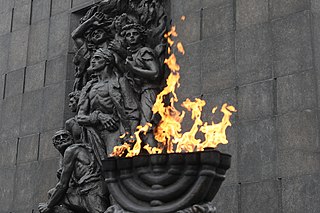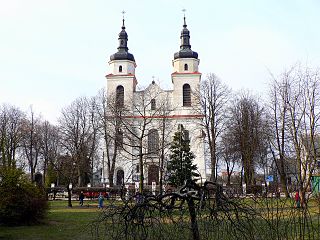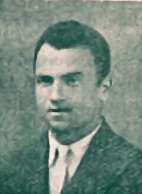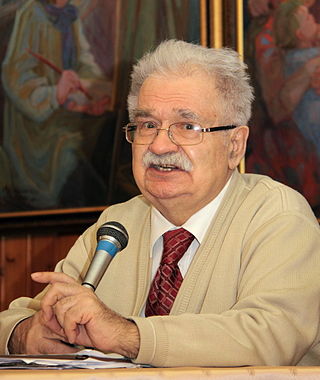
The Jedwabne pogrom was a massacre of Polish Jews in the town of Jedwabne, German-occupied Poland, on 10 July 1941, during World War II and the early stages of the Holocaust. Estimates of the number of victims vary from 300 to 1,600, including women, children, and elderly, many of whom were locked in a barn and burned alive.

The history of the Jews in Poland dates back at least 1,000 years. For centuries, Poland was home to the largest and most significant Ashkenazi Jewish community in the world. Poland was a principal center of Jewish culture, because of the long period of statutory religious tolerance and social autonomy which ended after the Partitions of Poland in the 18th century. During World War II there was a nearly complete genocidal destruction of the Polish Jewish community by Nazi Germany and its collaborators of various nationalities, during the German occupation of Poland between 1939 and 1945, called the Holocaust. Since the fall of communism in Poland, there has been a renewed interest in Jewish culture, featuring an annual Jewish Culture Festival, new study programs at Polish secondary schools and universities, and the opening of Warsaw's Museum of the History of Polish Jews.

Jedwabne is a town in northeast Poland, in Łomża County of Podlaskie Voivodeship, with 1,942 inhabitants (2002). It is notable for the Jedwabne pogrom of 10 July 1941, during the World War II German occupation of Poland.
Marek Jan Chodakiewicz is a Polish-American historian specializing in Central European history of the 19th and 20th centuries. He teaches at the Patrick Henry College and at the Institute of World Politics. He has been described as conservative and nationalistic, and his attitude towards minorities has been widely criticized.

Szymon Datner was a Polish historian, Holocaust survivor and underground operative from Białystok, best known for his studies of the Nazi war crimes and events of The Holocaust in the Białystok region. His 1946 Walka i zagłada białostockiego ghetta was one of the first studies of the Białystok Ghetto.
Żydokomuna is an anti-communist and antisemitic canard, or a pejorative stereotype, suggesting that most Jews collaborated with the Soviet Union in importing communism into Poland, or that there was an exclusively Jewish conspiracy to do so. A Polish language term for "Jewish Bolshevism", or more literally "Jewish communism", Żydokomuna is related to the "Jewish world conspiracy" myth.

Richard Conrad Lukas is an American historian and author of books and articles on military, diplomatic, Polish, and Polish-American history. He specializes in the history of Poland during World War II.
The Wąsosz pogrom was the World War II mass murder of Jewish residents of Wąsosz in German-occupied Poland, on 5 July 1941. The massacre was carried out by local Polish residents without participation of Germans.
Anti-Jewish violence in Poland from 1944 to 1946 preceded and followed the end of World War II in Europe and influenced the postwar history of the Jews as well as Polish-Jewish relations. It occurred amid a period of violence and anarchy across the country, caused by lawlessness and anti-communist resistance against the Soviet-backed communist takeover of Poland. The estimated number of Jewish victims varies and ranges up to 2,000. In 2021, Julian Kwiek published the first scientific register of incidents and victims of anti-Jewish violence in Poland in 1944–1947, according to his calculations, the number of victims was at least 1,074 to 1,121. Jews constituted between 2% and 3% of the total number of victims of postwar violence in the country, including the Polish Jews who managed to escape the Holocaust on territories of Poland annexed by the Soviet Union, and returned after the border changes imposed by the Allies at the Yalta Conference. The incidents ranged from individual attacks to pogroms.

Fear: Anti-Semitism in Poland after Auschwitz: An Essay in Historical Interpretation, is a book by Jan T. Gross, published by Random House and Princeton University Press in 2006. An edited Polish version was published in 2008 by Znak Publishers in Kraków as Strach: antysemityzm w Polsce tuż po wojnie: historia moralnej zapaści. In the book, Gross explores the issues concerning incidents of post-war anti-Jewish violence in Poland, with particular focus on the 1946 Kielce pogrom. Fear has received international attention and reviews in major newspapers; receiving both praise and criticism.

Neighbors: The Destruction of the Jewish Community in Jedwabne, Poland is a book published in 2000 written by Princeton University historian Jan T. Gross exploring the July 1941 Jedwabne massacre committed against Polish Jews by their non-Jewish neighbors in the village of Jedwabne in Nazi-occupied Poland.

Jerzy Robert Nowak is a Polish historian, and former columnist in right-wing Catholic media outlets including Nasz Dziennik, Telewizja Trwam, Radio Maryja.

Polish Jews were the primary victims of the Nazi Germany-organized Holocaust in Poland. Throughout the German occupation of Poland, Jews were rescued from the Holocaust by Polish people, at risk to their lives and the lives of their families. According to Yad Vashem, Israel's official memorial to the victims of the Holocaust, Poles were, by nationality, the most numerous persons identified as rescuing Jews during the Holocaust. By January 2022, 7,232 people in Poland have been recognized by the State of Israel as Righteous among the Nations.
Racism in Poland in the 20th and 21st centuries has been a subject of extensive study. Ethnic minorities made up a greater proportion of the country's population from the founding of the Polish state through the Second Polish Republic than in the 21st century, when government statistics show 94% or more of the population self-reporting as ethnically Polish.

Monsignor Waldemar Chrostowski is a Polish Catholic priest, Bible scholar, and theologian. He is a professor of theology at the Cardinal Stefan Wyszynski University in Warsaw. Chrostowski has attracted attention for propagating antisemitic and homophobic views.

Jan Zbigniew Grabowski is a Polish-Canadian professor of history at the University of Ottawa, specializing in Jewish–Polish relations in German-occupied Poland during World War II and the Holocaust in Poland.

Hunt for the Jews: Betrayal and Murder in German-Occupied Poland is a 2013 book about the Holocaust in Poland by Jan Grabowski. The 2013 English edition followed a 2011 Polish-language edition and was in turn followed by a 2016 Hebrew edition.

Ewa Kurek is a Polish historian specializing in Polish-Jewish history during World War II. She has been associated with the far-right, and her revisionist views regarding the Holocaust in Poland have been widely categorized as indicative of antisemitism and Holocaust denial.

Golden Harvest is a 2011 book about the Holocaust in Poland. It was written by historians Jan T. Gross and Irena Grudzińska-Gross. It was first published in Polish in March 2011, with an English translation following in 2012.

Jan Krzysztof Żaryn is a Polish historian, professor and politician, who was a Senator in the Senate of Poland from 2015 to 2019.















